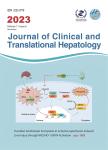Hepatitis C Virus, Insulin Resistance, and Steatosis
Hepatitis C Virus, Insulin Resistance, and Steatosis作者机构:Department of Gastroenterology and Hepatology Sisters of Charity University Hospital Center Zagreb Croatia Department of Pharmacology Faculty of Medicine University of Osijek Osijek Croatia Department of Pharmacology Faculty of MedicineUniversity of Osijek Department of Endocrinology and metabolism disorders University Hospital Center Osijek Osijek Croatia
出 版 物:《Journal of Clinical and Translational Hepatology》 (临床与转化肝病杂志(英文版))
年 卷 期:2016年第4卷第1期
页 面:66-75页
学科分类:1002[医学-临床医学] 100201[医学-内科学(含:心血管病、血液病、呼吸系病、消化系病、内分泌与代谢病、肾病、风湿病、传染病)] 10[医学]
主 题:Hepatitis C virus Metabolic syndrome Insulin resistance Steatosis
摘 要:Hepatitis C virus (HCV) is one of the main causes of liver disease *** steatosis is a common finding in many hepatic and extrahepatic disorders,the most common being metabolic syndrome (MS).Overtime,it has been shown that the frequent coexistence of these two conditions is not coincidental,since many epidemiological,clinical,and experimental studies have indicated HCV to be strongly associated with liver steatosis and numerous metabolic ***,we present an overview of publications that provide clinical evidence of the metabolic effects of HCV and summarize the available data on the pathogenetic mechanisms of this *** has been shown that HCV infection can induce insulin resistance (IR) in the liver and peripheral tissues through multiple *** research has suggested that HCV interferes with insulin signaling both directly and indirectly,inducing the production of several proinflammatory *** replication,assembly,and release from hepatocytes require close interactions with lipid droplets and host *** modulation of lipid metabolism in host cells can induce hepatic steatosis,which is more pronounced in patients with HCV genotype *** risk of steatosis depends on several viral factors (including genotype,viral load,and gene mutations) and host features (visceral obesity,type 2 diabetes mellitus,genetic predisposition,medication use,and alcohol consumption).HCV-related IR and steatosis have been shown to have a remarkable clinical impact on the prognosis of HCV infection and quality of life,due to their association with resistance to antiviral therapy,progression of hepatic fibrosis,and development of hepatocellular ***,HCV-induced IR,oxidative stress,and changes in lipid and iron metabolism lead to glucose intolerance,arterial hypertension,hyperuricemia,and atherosclerosis,resulting in increased cardiovascular mortality.



